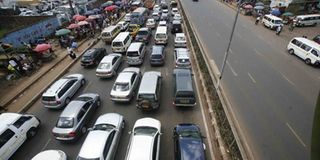To return to the path to prosperity, we must revamp our public service

A traffic jam at Ngara in Nairobi on December 23, 2013. The mark of progress is that the rich take public transport. FILE PHOTO | EVANS HABIL |
What you need to know:
- In Kenya, it is a truism that as soon as they are able to, people remove themselves from public services.
- That is mostly because public services are so bad, so pathetic that it is foolhardy to keep relying on them if you have options.
“The mark of a developed country is not that the poor own cars. It is that the rich take public transport.”
So said Enrique Penalosa, the Mayor of Bogota, Colombia. Now Colombia is neither in the West nor the East, for those who have an aversion to anything West or East. It is a developing country, like Kenya, so lessons from there should be especially poignant.
Mayor Penalosa is credited with reducing traffic jams in Bogota, which were as bad as ours in Nairobi.
His initiative included dedicating traffic lanes solely for public transport, increasing the cost of driving personal cars into the major metropolitan areas, and then improving and increasing the public buses on the roads to entice the middle class and the rich onto buses.
He ensured that the buses maintained a reliable timetable and were efficient, and also had different classes of buses with some being more expensive and comfortable to suit the “tastes” of the richer people. It worked to decongest the city.
But more than public transport, Mayor Penalosa’s quote speaks to the role of the State in providing basic public services and the attitude that comes when most people are in the middle-class as opposed to being poor.
PATHETIC
In Kenya, it is a truism that as soon as they are able to, people remove themselves from public services, be it education, health, security, transport, agriculture, veterinary services or pensions.
That is mostly because public services are so bad, so pathetic that it is foolhardy to keep relying on them if you have options. And the result is that what many developed countries — but for the US and now UK fast following — regard as a right has become a privilege.
Thus, we will prefer private “academies” to public schools because the latter are congested and it is immensely difficult to get a good future with that sort of a foundation.
And we will break our backs to make sure that our daughters and sons get that solid foundation that they need.
Indeed, so lucrative is this sector as a business that even people with no foundation or background in education and teaching have set up private schools and academies and are doing extremely well financially.
HUGE SUBSIDY
Yet it was not always like this. Soon after independence public schools were excellent though inadequate for the numbers.
Yes, there was a small fee to be paid, which increased, depending on the class of school it was, but there was a huge taxpayer subsidy into public education because it was clear that the one sure way to get out of poverty and into the middle class was by getting an education.
Even diplomats and the international community posted in Kenya used Kenyan public schools and in the course of my international travels I have come across two people, who attended Hospital Hill Primary School when their parents were on assignment in Kenya in the 1970s.
The ill-thought through Structural Adjustment Programmes of the World Bank and IMF put paid to the idea of quality public education, health and other public services as our governments — together with others in Africa — succumbed to the pressures and drastically reduced subsidies to education, health and other public services.
But we need to seriously re-think this matter if we want to be a developed country. A country needs millions of people with quality basic education if it is to develop, which only public education can provide.
We have to re-vamp our public services and ensure that our taxes are going into that rather than into the pockets of a few as corruption or waste in excessive emoluments that we can’t afford.
For this corruption and waste is the one issue that will always hamper whatever efforts that are conceived to nudge us forward. And by not dealing with grand corruption at the top, by allowing impunity to reign, then everyone and anyone who can will engage in it even if only to make sure their child attends private school.





